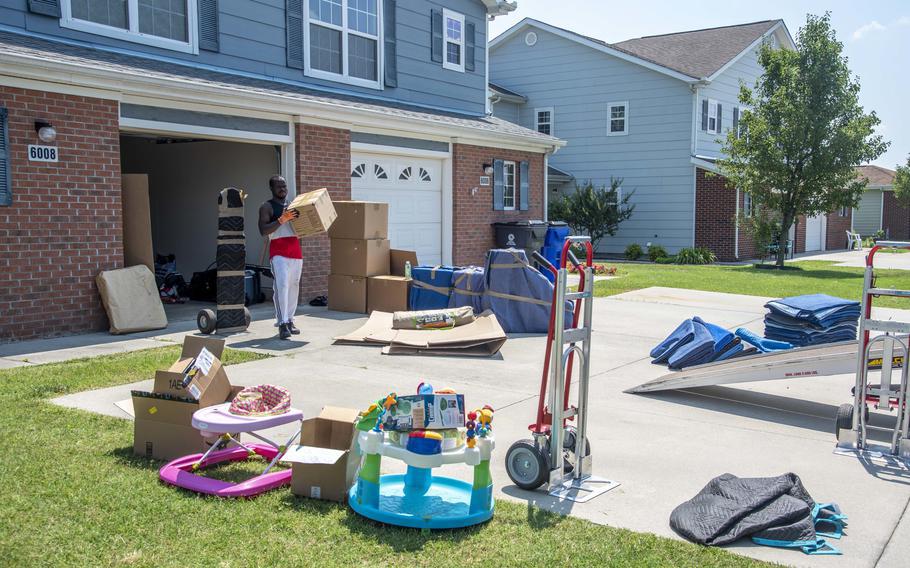
Jerry Leama, a mover with Barry Van Lines, carries a box of household goods onto a moving truck at Dover Air Force Base, Del., on July 16, 2021. (Nicole Leidholm/U.S. Air Force)
WASHINGTON — U.S. Transportation Command has delayed the rollout of new computer systems designed to help streamline the annual moving process for hundreds of thousands of military families and designate a single contractor to ship their household goods around the world, defense officials said.
The command awarded its global household goods contract worth an estimated $6.2 billion to HomeSafe Alliance in November 2021. The company will provide “complete door-to-door global household goods relocation transportation and warehouse services worldwide,” once the company takes over military moves, according to the command’s announcement.
Moves originally were slated to begin under this new contract in September. But technical issues arose in the development of the Defense Department’s MilMove and HomeSafe Alliance’s HomeSafe Connect — two new computer programs designed to plan, track and expedite moves, command officials said.
More than 800 companies are responsible for 170,000 domestic shipments and 300,000 globally each year, said Andy Dawson, director of the Defense Personal Property Management Office at U.S. Transportation Command. During the military’s peak moving season in the summer, the customer satisfaction rate was 74% for 2023.
“That equates to tens of thousands of service members and families that aren’t satisfied with their relocation experience, and we owe it to them to deliver,” Dawson said. “It’s safe to say the large volume, the majority of shipments will remain in the [current system] for peak season [next year].”
The change in systems was driven by complaints from military families about delays in pickups and deliveries of goods and damage to items during transportation.
A 2020 analysis by the Defense Department inspector general found 20% of domestic household goods shipments in 2018 had at least one damage claim.
The analysis also concluded the Transportation Command did not have reliable data to determine whether service members’ goods were being delivered on time or in good condition.
The command is working with HomeSafe to schedule testing dates between mid-December 2023 through the end of January. Once that’s complete, defense officials have picked several bases in the U.S. where short local moves, within a 50-mile radius, will begin. For example, in the Norfolk, Va., area, they’ll be moving shipments within ZIP codes south of the Chesapeake Bay, Dawson said.
The command developed a system called MilMove for service members to upload change-of-station orders and initiate a request for their new shipment to be scheduled. HomeSafe Alliance developed HomeSafe Connect to be used by service members, the government and industry to track a shipment sent from MilMove.
Any substantial rollout, however, won’t take place from May through Labor Day because of risks associated with trying a new system during peak season for moving. Between 100,000 and 150,000 shipments take place during that time, said Jessica Brown, a Transportation Command spokeswoman.
“Moving in and of itself is a stressful situation,” Dawson said. “Changes are tremendously hard to execute during that peak season period. As a strategy to reduce the risk, we’ve just kind of taken that off the table.”